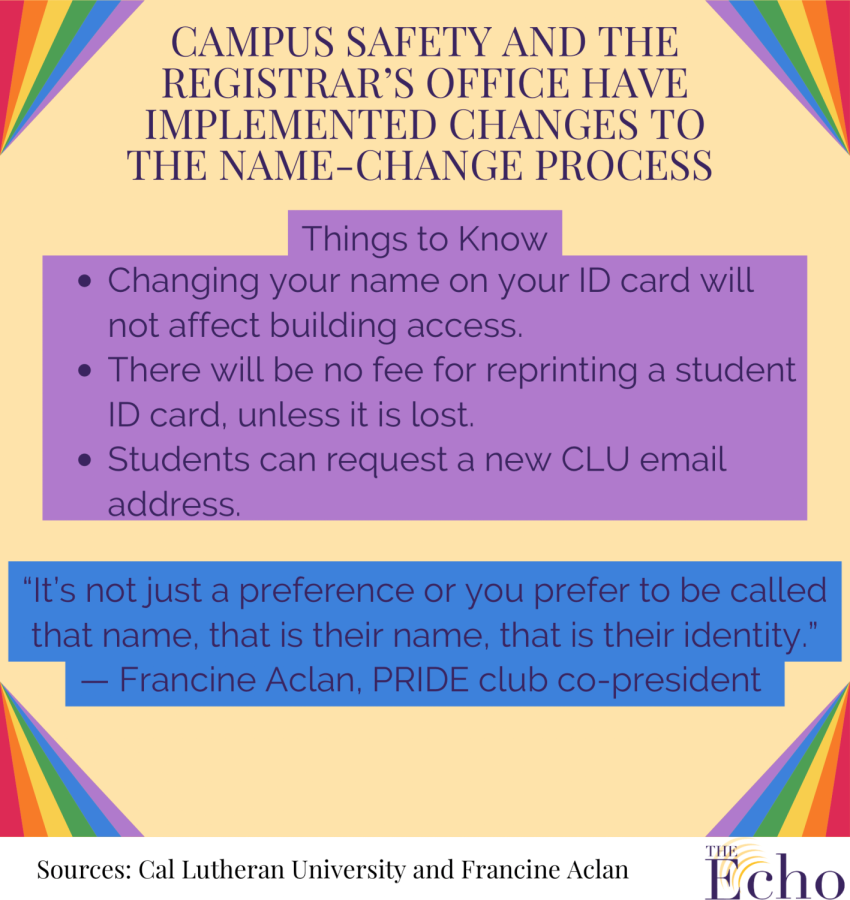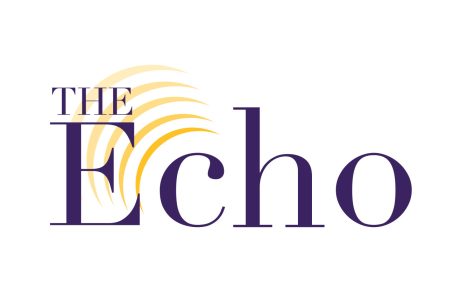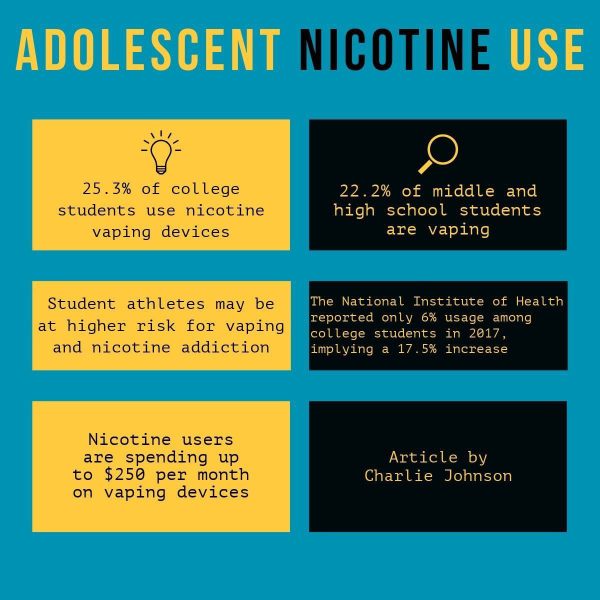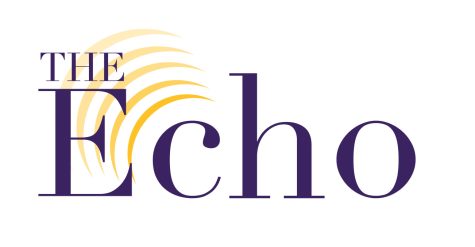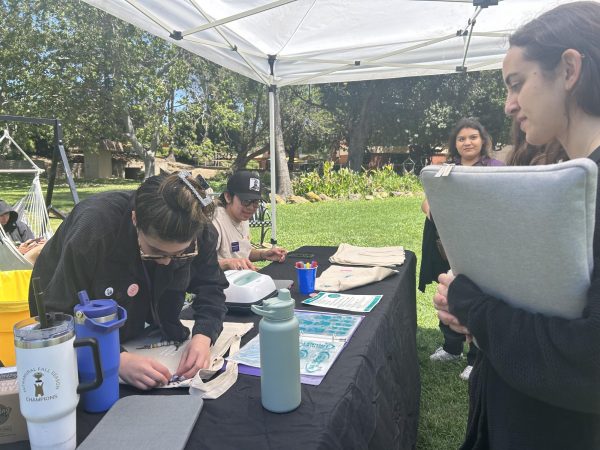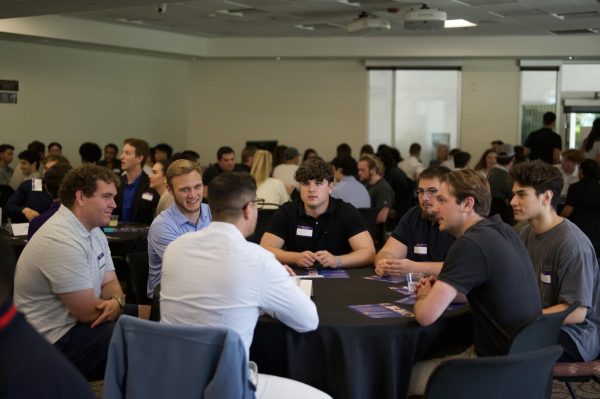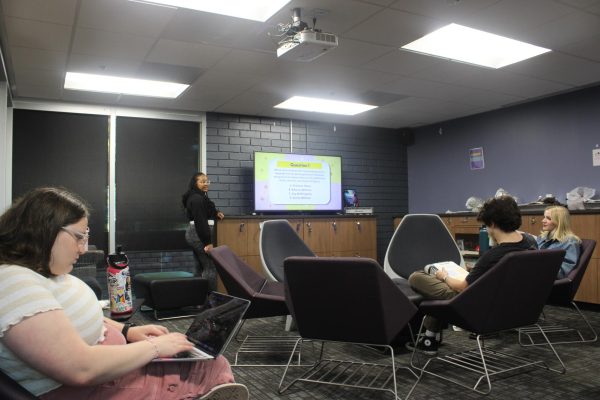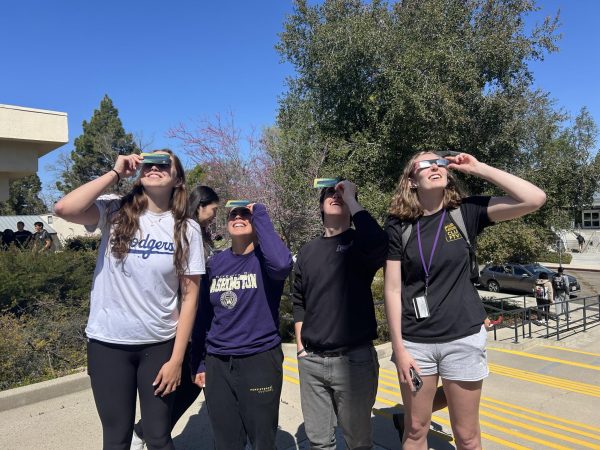Name changes now available for student ID cards
Infographic by Elisa Zody - Digital and Multimedia Editor
Following the initial name change policy implemented in 2016, altering student ID cards and student emails addresses is now available as well.
September 20, 2022
Because of the efforts put forth by the People Respecting Individuality, Diversity and Equality, or PRIDE, club, California Lutheran University now reflects preferred names on student identification cards and emails. While the ability to change names to reflect preferred names on documents has been available since the 2016 fall semester, this change did not include student ID cards or emails. Campus Safety and the Registrar’s office have implemented changes to the already available name-change process with the goal of making it more accessible and fluid.
“The preferred or first name will be either used or displayed with the legal name in the following systems: MyCLU Portal, Blackboard classes, WebAdvisor, Student Planning, Faculty Advisee List, Student Self-Service and Student Housing,” Director of Campus Safety David Hilke said in an email interview.
In the case of students who need to be granted access to certain facilities on campus, such as art studios and science labs, a preferred name would not hinder this request.
“For access control requests, Campus Safety asks that the requesting party provide the student’s name and ID number. Campus Safety will then look up the student via their ID number and we will have access to their preferred name,” Hilke said.
Although student ID card reprints can cost money, Hilke assures this change does not include a fee unless the ID card is lost or stolen.
“There will be no fees charged for printing an ID for the purpose of changing a preferred name,” Hilke said.
Dylan Gallagher, co-president of the Cal Lutheran PRIDE club, was one of the major contributors to getting this change initiated by the university. Following transphobic and homophobic incidents on campus, Gallagher knew something needed to change.
“I sent out these emails because I was desperate for my community, and that’s what kind of got these talks [started],” Gallagher said.
After these emails, Gallagher sat down with several notable members of different departments on campus to have a conversation about what needed to change.
“We got those discussions started at the beginning of summer to see what we could do to better support trans students, and that is kind of just something that we followed up, and saw progress with by the end of the summer,” Gallagher said.
PRIDE co-President Francine Aclan said this change goes a lot deeper than just being a preferred name.
“It’s not just a preference or you just prefer to be called that name, that is their name, that is their identity, it is very closely linked to their LGBTQ+ identity,” Aclan said.
Maria Kohnke, associate vice president of Academic Services and Registrar, said the university was ahead of the curve when making the decision to allow preferred names.
“We were fairly early in making it, at least based on my conversations with other registrars, we were fairly early in having a policy to allow students to choose their first name,” Kohnke said.
This addition comes six years after the initial option for name changes. Kohnke said certain offices had to determine if they could even accept preferred names for official documents.
“The decision came down to: did that office need to use the legal name, or was that office free to use the chosen name of the student, which is what everyone wanted to do,” Kohnke said.
Kohnke said there is a university rule allowing people to review policies and other matters on campus every few years, such as this policy. This was a revision that may not have happened without Gallagher.
“It was because I saw an issue and I said something that they started to become more proactive with it,” Gallagher said.
According to Aclan, Gallagher’s hard work has allowed the university to create a slightly more inclusive environment for LGBTQ+ students on campus.
Aclan said she was there for support, but Gallagher was the driving force for the change.
“Most of this change was made by our co-President Dylan Gallagher, so my main role was just supporting him with anything that he needed,” Aclan said. “This has been a very big passion project specifically for him because of his involvement with the trans community.”
However, Gallagher said this was more than just a passion project for him.
“A lot of this was something I did out of necessity,” Gallagher said. “When faculty at this school don’t necessarily have to deal with these issues themselves, they don’t see that there is a problem.”
Aclan said she thinks the university is beginning to make a change for a better future.
“Personally, I’m really excited because I think this campus is slowly moving into a more accessible campus, a more inclusive campus, and that’s really what I want to see,” Aclan said.
In addition, both Aclan and Gallagher said PRIDE club is not just a club for students who identify as a member of the community, but for anyone interested in engaging with the LGBTQ+ community or anyone who wants to know how to be supportive.

